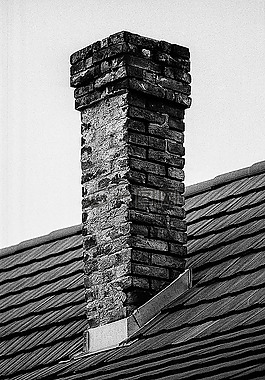Why Your Chimney Needs Cleaning
The Importance of Chimney Cleaning How Often Should You Clean Your Chimney? Methods of Chimney Cleaning
Rowan
7/3/20254 min leer


Why Your Chimney Needs Cleaning: Frequency, Methods, and Expert Tips
Your chimney might seem like a passive part of your home, quietly doing its job in the background. However, neglecting chimney maintenance can lead to serious issues, from reduced efficiency to potential fire hazards. In this blog, we'll explore why chimney cleaning is essential, how often you should schedule it, and the best methods to keep your chimney in top condition.
The Importance of Chimney Cleaning
Fire Prevention
One of the primary reasons for chimney cleaning is fire prevention. As wood burns, it produces creosote, a highly flammable tar - like substance that builds up on the chimney walls. Over time, the accumulation of creosote can ignite, causing a chimney fire. A clean chimney reduces the risk of such dangerous fires, protecting your home and loved ones. According to the Chimney Safety Institute of America (CSIA), nearly 23,000 chimney fires occur in the United States each year, many of which could have been avoided with regular cleaning.
Improved Efficiency
A dirty chimney restricts the flow of smoke and gases, reducing the efficiency of your fireplace or wood - burning stove. When the chimney is clogged with debris, it can cause smoke to back up into your home, filling it with harmful fumes and unpleasant odors. A clean chimney ensures proper draft, allowing your heating appliance to operate more efficiently and reducing your energy consumption. This not only saves you money on fuel costs but also extends the lifespan of your heating equipment.
Health and Safety
Chimneys can also harbor harmful substances such as carbon monoxide (CO), a colorless and odorless gas that can be deadly in high concentrations. A blocked chimney can cause CO to leak into your home, posing a significant health risk to you and your family. Regular chimney cleaning helps to remove any blockages, ensuring that CO is safely vented outside. Additionally, a clean chimney reduces the presence of dust, soot, and other allergens that can affect indoor air quality, creating a healthier living environment.
How Often Should You Clean Your Chimney?
The frequency of chimney cleaning depends on several factors, including the type of fuel you use, how often you use your fireplace or stove, and the design of your chimney.
Wood - Burning Appliances: If you use a wood - burning fireplace or stove regularly (more than once a week during the heating season), it's recommended to have your chimney cleaned at least once a year. For heavy users or those burning wet or low - quality wood, more frequent cleanings (every 6 months) may be necessary.
Gas - Burning Appliances: Gas fireplaces and stoves generally produce less creosote and debris than wood - burning appliances. However, they still require regular maintenance. A gas chimney should be inspected and cleaned at least every 2 - 3 years to ensure proper operation and remove any potential blockages or buildup.
Pellet Stoves: Pellet stoves burn compressed wood pellets, which produce less creosote than traditional wood. Nevertheless, they can still accumulate ash and debris. It's advisable to clean pellet stove chimneys every 1 - 2 years, depending on usage.
Methods of Chimney Cleaning
Professional Chimney Sweep
Hiring a professional chimney sweep is the most thorough and safe way to clean your chimney. Professional chimney sweeps are trained and certified to inspect, clean, and repair chimneys. They use specialized equipment, such as brushes, rods, and vacuums, to remove creosote, soot, and debris from the chimney flue and other components. Professional chimney sweeps also perform a detailed inspection of your chimney and heating appliance to identify any potential problems, such as cracks, leaks, or damaged parts. This ensures that your chimney is not only clean but also in good working condition.
DIY Chimney Cleaning
If you're a handy homeowner and feel comfortable working on your chimney, you can attempt a DIY chimney cleaning. However, it's important to note that DIY chimney cleaning can be dangerous and requires proper safety precautions. Here are the basic steps for a DIY chimney cleaning:
Gather Your Tools: You'll need a chimney brush, extension rods, a dustpan and brush, a drop cloth, and safety goggles and gloves.
Prepare the Area: Lay down a drop cloth around the fireplace to catch any debris. Close off the fireplace damper to prevent debris from falling into the room.
Brush the Chimney: Attach the chimney brush to the extension rods and insert it into the chimney flue. Use a back - and - forth motion to scrub the walls of the chimney, working your way from the top to the bottom.
Vacuum the Debris: After brushing, use a shop vacuum to remove any loose debris from the fireplace and the chimney base.
Inspect the Chimney: Take a look inside the chimney to ensure that all the debris has been removed and that there are no visible signs of damage or blockages.
While DIY chimney cleaning can save you money, it's not recommended for everyone. If you're unsure about how to clean your chimney properly or if you notice any signs of damage or problems during the cleaning process, it's best to call a professional chimney sweep.
Additional Tips for Chimney Maintenance
Burn Dry Wood: Burning dry, seasoned wood produces less creosote than wet or green wood. Make sure your wood has a moisture content of less than 20% before burning it in your fireplace or stove.
Use a Spark Arrestor: A spark arrestor is a screen or cap that fits over the top of your chimney. It helps to prevent sparks and embers from escaping the chimney and starting a fire outside your home.
Keep the Fireplace Clean: Regularly clean the ashes and debris from your fireplace to prevent them from building up and causing blockages.
In conclusion, chimney cleaning is an essential part of home maintenance. By understanding why your chimney needs cleaning, how often to schedule it, and the best methods for cleaning, you can ensure the safety, efficiency, and longevity of your chimney and heating appliance. Whether you choose to hire a professional chimney sweep or attempt a DIY cleaning, make sure to prioritize chimney maintenance to protect your home and your family.
